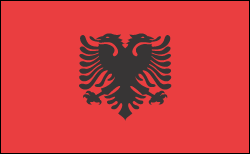Albania News & Current Events


Political Infighting Stalls Progress
Ilir Meta, elected prime minister in 1999, rapidly moved forward in his first years to modernize the economy, privatize business, fight crime, and reform the judiciary and tax systems. He resigned in Jan. 2002, frustrated by political infighting. In June 2002, former general Alfred Moisiu was elected president, endorsed by both the Socialists (headed by Fatos Nano) and the Democrats (led by Sali Berisha), in an effort to end the unproductive political fractiousness that has stalemated the government. The political duel between Nano and Berisha continued, however, and little improvement was evident in the standard of living for Albanians. In 2005 elections, Berisha replaced Nano, who had been appointed by Moisiu in 2002 as prime minister.
Bamir Topi, a scientist and senior member of Berisha's Democratic Party, was elected president by parliament in July 2007.
Albania joined NATO in May 2009 and later in the month applied for membership in the European Union.
In July 2009's elections, the closest since 1990, Berisha's center-right coalition narrowly defeated the opposition socialists, who were led by Edi Rama. The opposition disputed the results and accused Berisha of voter intimidation.
At Last a New Albanian President Is Elected
After three failed attempts to elect a president, the parliament finally succeeded on June 11, 2012, when Interior Minister Bujar Nishani was elected with 73 votes of the 140 seats. Flamur Noka was named new interior minister and Edmond Panariti became foreign minister.
Sali Berisha, prime minister since 2005, was defeated in his third bid for the office. General elections held on June 23, 2013, resulted in victory for Edi Rama and his opposition Socialist Party, 53% to 36%. Berisha conceded defeat and announced his intention to step down from leadership of the Democratic Party, while Rama celebrated his victory and reiterated his goal to secure EU membership for Albania.
See also Encyclopedia: Albania .
U.S. State Dept. Country Notes: Albania
Institute of Statistics www.instat.gov.al







